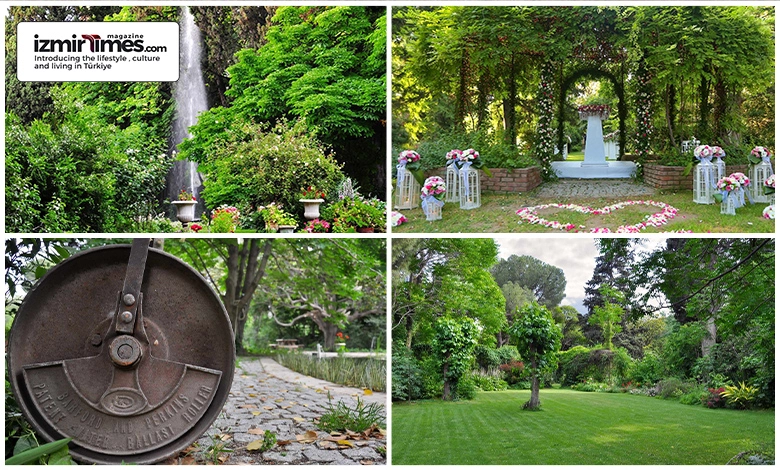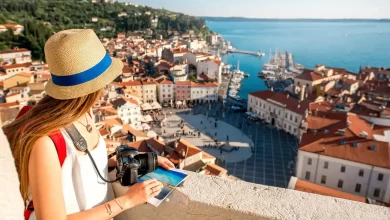Edward Whittall Wedding Garden in Izmir
Blooming Paradise: Exploring the Edward Whittall Garden in Izmir

Edward Whittall’s garden doors open to the glory of history
Edward Whittall Garden. You can pause at the garden gate and listen to the concert of a thousand frogs accompanied by a cello, two violins, and the rustle of a silk dress. Walk along the street under the long shadows cast by ancient cypresses and pines, bordered by the fragrance of various roses and jasmine.
See the wooden shutters of the villa in the middle of the garden open, and the light pours into the lawns and illuminates the faces of the guests as they enjoy great food and dancing. Suppose you are planning a special celebration, a wedding, an anniversary party, or a coming-of-age celebration. In that case, there is no better place to capture the grandeur of a bygone era than the Edward Vital Gardens around Izmir.

Where is Izmir Edward Whittall Wedding Garden ?
The history of Izmir is intertwined with the heritage of Levantine families.
Most magnificent gardens and merchants’ mansions in Bornova and Buja have been lost to time due to development and erosion. Still, Edward Whittall’s garden is a lasting legacy of the settlers’ industry and vision. One can still imagine family garden parties and lavish wedding celebrations within the walls today. On the campus, the echoes of their voices are broadcast in Turkish, French, English, Greek, Italian, and Dutch languages. The language does not matter; their voices ring with joy and laughter.
Remember poets such as Pierre Loti, Lamartine, and Lord Byron, who used to walk in this historic garden. Hear the chatter of guests Prince George and the Duke of Edinburgh as they danced under the same trees to the music next to the lily ponds. And bow your head for a moment to reverently remember that half a century later, Atatürk walked on the terrace of this garden before gathering his forces to retake the city of Izmir.

Location and address of Edward Whittall Wedding Garden in Izmir
Edward Whittall’s Today
Edward Whittall made his garden for today, inspired by history as well as by the hands and imagination of gardeners, with towering trees, terraced lawns, ponds, and meandering paths planted with whimsical arrays of shrubs and flowers.. He was a businessman who devoted his free time to the science of the classification of plants and the art of horticulture.
The Creation of an Anglo-Italian Oasis in the Orient
Edward Whittall Wedding Garden in Izmir had turned the grounds of his family home into a botanical treasure. Beneath the already mature cypress and oak trees, he designed much of the current structure, overseeing the placement of prominent trees, digging canals for spring water irrigation, and creating lily ponds full of fish and frogs. Planning paths covered with lilies and acanthus that wind between the branches of bushes, fruit trees, and flowers. In a letter to Sir Thistleton Dyer of Kew, London, Edward Whittall described the garden as “an oriental garden with a mixture of English and Italian ideas.”

Who was Edward Whittall?
Eduard Vital (Smyrna, Ottoman Empire, September 9, 1851, July 15, 1917) was an Anglo-Ottoman merchant and amateur botanist, who is now known for collecting and shipping many varieties of onions to Europe.
Born in Bornova in 1851, Eduard Whittall grew up surrounded by this house’s vast grounds and old cypress trees, now the University of the Aegean. At his wedding in 1875, he moved to the garden that bears his name. Known as a collector and breeder of flower and plant species from Asia Minor to Izmir, the cradle of organic cultivation and agriculture, he avidly enjoys shooting and fishing in Izmir as a sportsman. He hired collectors and sent them to Anatolia to bring back unusual plant specimens. His regular correspondence with Kew Planters in London is a testament to his meticulous record-keeping, commitment to propagating remarkable seeds and bulbs, and his European obsession with discovery and cataloging. The new tulip, snow, veronica, hyacinth, and fritillary species all bear his name and signature.
Although Edward Whittall died in 1917, the garden continued to flourish in the hands of his grandson, Brian Giraud. Introducing a diverse range of new plants, landscaping lily ponds, and ensuring the continued flow of water from wells dug in the hills above the area guarantees the legacy of Edward Whittall and this great and historic garden for the future.











